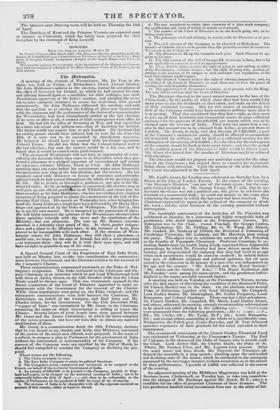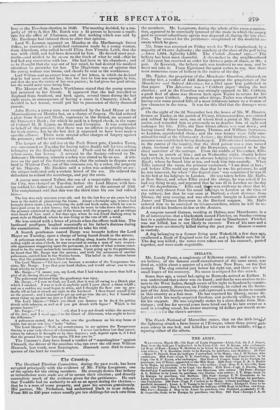Mr. Lyall's return for London was celebrated on Saturday last,
by a dinner at the City of London Tavern. In the course of the evening, " his Majesty's Ministers" was one of the toasts given ; but the com- pany refused to drink it. Mr. George Young, M. P. said, that he un- derstood the dinner was not a political one, but given to celebrate the triumph of a commercial body : he could not remain in the room after witnessing the manner in which the last toast had been received. The Chairman expressed his regret at the refusal of the company to drink the toast ; and the other business of the evening proceeded without interruption.
The hundredth anniversary of the birth-day of Dr. Priestley was celebrated on Monday, by a numerous and highly respectable body of gentlemen, who dined together at the Freemason's Tavern. Dr. Babington was in the Chair. Count Funchall, Sir George Cayley, Mr. lialyburton, Mr. M. Phillips, Mr. G. W. Wood, Mr. Hawes, Mr. Gaskell, Dr. Daubeny of Oxford, the Reverend J. Cumming of
Cambridge University, Mr. Lubbock, and Mr. Hatchett, were amoefe the party. The object was to celebrate the nativity of Dr. Priestley as the founder of Pneumatic Chemistry. Professor Cumming, in re- turning thanks upon his health being drunk, regretted those disgraceful- proceedings by which Dr. Priestley had been driven away from this country, and congratulated the company that they had lived to an age when such occurrences would be scarcely credited : he beheld before- him men of different religious and political opinions, but all were- united in the endeavour to do honour to a man who was unhonoured in his age and his country. "Mr. Lubbock and the Royal Society," "Mr. Aikin and the Society of Arts," " The Royal Institution and Mr. Faraday," were among the toasts given; and the gentlemen indivi- dualized in the toasts severally returned thanks. A meeting was held on Tuesday, at the Freemason's Tavern, to con- sider the best means of alleviating the condition of the distressed Poles.
Sir Francis Burdett was in the chair. On the platform were several Poles of distinction, together with Lord Ebrington, Mr. Campbell, Lord Dudley Stuart, Mr. Buckingham, Mr. Cutlar Fergusson, Louis Bonaparte, and Colonel Stanhope. There was but a thin attendance. Sir Francis Burdett, Mr. Campbell, Mr. Merle, Lord Dudley Stuart, and others, addressed the meeting, strongly recommending subscriptions to be raised and relief afforded to the suffering exiles. `'ubseriptions were announced from the following gentlemen,—Mr. G. Evans, P., 20/. ; Mr. Clarke, 10/. ; Mr. Tynte, M.P., 101.; Louis Bonaparte, 101.; and several others, amounting in the whole to a considerable sum. Niemcewiez, the Polish poet, Count Korysko, and III. Turr delivered speeches expressive of their gratitude for the relief extended to their countrymen.
The seventeenth anniversary of the Covent Garden Theatrical Fund was celebrated on Wednesday, at the Freemason's Tavern. The Earl of Cadogan, in the absence of the Duke of Sussex, who is unwell, took the Chair. Lord Arthur Hill, Sir Charles Doyle, the Duke of St.
Albans, Mr. Stephen Price, and Mr. Laporte were present. After the usual toasts had been drank, Mr. Fawcett, the Treasurer, ad-
dressed the assembly in a long speech ; dwelling upon the unfriended and declining state of the drama, which he attributed to the monopoly possessed by the two larger theatres without restriction as to the nature of their performances. Upwards of 1,0001. was collected in the course of the evening.
An adjourned meeting of the Middlesex Magistrates was held at the Sessions-house, Clerkenwell, on Tuesday last, to take into considera- tion the charges of Mr. Easthope against Mr. Rotch, M. P., who is a candidate for the office of perpetual Chairman of these Sessions. The two gentlemen bandied about accusations from one to the other of bri- bery at the Evesham election in 1830. The meeting decided, by a ma- jority of 29 to 3, that Mr. Botch was a fit person to become a candi- date for the office of Chairman, and that nothing which was said by Mr. Easthope had induced them to alter that opinion.
Lord W. Lennox appeared on Monday at the Marlborough Street Office, to contradict a published statement made by a young woman, from Aberdeen, who called herself Eliza Ann Victoria Leith, that she was with child, and had been deserted by him. He denied most posi- tively—and wished to be sworn to the truth of what he said—that he had had any connexion with her. She had been to his chambers ; and as he thought that she was out of her mind, he had desired his medical attendant to prescribe for her. The Magistrate was of opinion that the young woman was insane, and should be sent to the workhouse.
Lord William read an extract from one of her letters, in which she declared that he had never solicited her; that her love for him was unsought by him, and that she was the victim of her own passion; he had given her good advice, but she would never cease loving him.
The Master of St. Anne's Workhouse stated that the young woman bad returned to her friends. It appeared that she had travelled to England from Scotland, and back again, several times during the last eight years, in consequence of having a cause in Chancery, which, if decided in her favour, would put her in possession of thirty thousand pounds.
John Byers, a young man, was examined by the Lord Mayor at the Mansionhouse on Monday last, on a charge of forgery. He had ordered a plate from Sears and Heath, engravers in the Strand, on account of the Doncaster Bunk; for which he paid in a forged cheek, in the name of Colonel 11. B. Lygon, on Hoare and Company. It was contended hi behalf of the prisoner, that there was no offence in printing blanks for bank-notes ; but by the last Act it appeared to have been made a specific offence. There were several other charges of forgery against the prisoner; and he was remanded.
The keeper of the toll-bar at the Park Street gate, Camden Town, was summoned on Tuesday for having taken double toll for two zebras, belonging to the Zoological Society. Plush said he did not consider zebras asses, but horses. A servant to the Society referred to Dr. Johnson's Dictionary, wherein a zebra was stated to be an ass. A wit- ness on the part of the Society stated, that the animals in dispute were bred in Windsor Park, out of the common ass, by a zebra, the property of his Majesty. Mr. Hoskins said a zebra was undoubtedly an ass : the stripes indicated only a certain breed of the ass. He ordered the defendant to refund the overcharge, and pay the costs.
A young man named Talbot, the son of a respectable tradesman in the City, was charged on Tuesday, before the Lord Mayor, with hav- ing robbed his father of bank-notes and gold to the amount of 250/. The complainant said that this was the third time his son had robbed him—
The boy was only nineteen years old, and for the last five or six years be had been in the habit of plundering the house. About a fortnight ago, witness had .'
brought down stairs a ha!, containing the gold and bank-notes which be was to have paid away in a few hours; but, when he went to take down the shutters, the prisoner contrived to slip out of the house with the property; and DO tidings were heard of him until a few days ago, when be was found dashing away in great style at Deptford, where he was living at the rate of 501. a-week.
He was armed with a brace of pistols when the officer took him. The hardened profligate laughed repeatedly at his father's distress during the examination. He was committed to take his trial.
A Scotch gentleman named Burge was brought before the Lord Mayor on Tuesday, upon a charge of being found drunk in the streets.
A policeman stated, that as lie was walking along Austin Friars on the pre- ceding night at nine o'clock, he was surprised at seeing a man of very respect- able appearance staggering upon the pavement, in a state of what witness consi- dered to be the most melancholy intoxication. Upon going up to the gentleman, he found that Mr. Burge was the person; and with the assistance of another policeman, carried him to the Station-house. The belief in the Station-house was, that the gentleman was blind drunk. The Lord Mayor—" I'd have you become a member of the Temperance So- ciety, Mr. Burge. I see that your hand shakes, and would advise you to turn from whisky to water." Mr. Burge—" I assure you, my Lord, that I had taken no more than half a pint of ale during the evening."
The policeman declared that the gentleman was tipsy.
Mr. Burge—" I vow to God, my Lord, that it was all owing to a Dutch pipe which I smoked. I was as well as anybody until I gave about a dozen whiffs ; and on a sudden my head began to whiz and I thought the floor rose up gra- dually till at last it struck me right in the forehead. I than found myself lying on the ground ; and I managed to get up and go into the air; but I found the street risin up against me just as I did the floor." The Loi.c1 Mayor—" Don't you think you deserve to he fined for getting drunk with tobacco, as well as if you got drunk with liquor? Which- is the greater luxury?" Mr. Ilurge—" I c., 7, : .• that I was not drunk within the meaning
of the Act ; and I ill ij,1;,i to the Court of Aldermen, who ought to know the difference."
A policeman stated, that he often saw the gentleman on his way home at
night, but never saw him " before.
The Lord Mayor—" Well, my countryman; in my opinion the Temperance Society is your wily chance of reformation. I never can believe but that Intoxi- cation by tobacco is brought on by slow degrees; and, depend upon it, if I find that the ground hits your face again, I'll fine you 5s."
The Coroner's Jury have found a verdict of "manslaughter" against Chinnell, the driver of the omnibus who ran over the old man William Hancock, last week, near Kensington. Hancock soon died in conse- quence of the hurt he received.



















 Previous page
Previous page